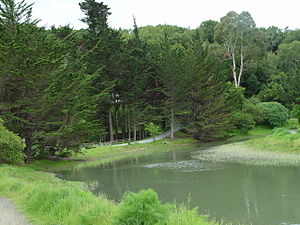| Coyote Creek | |
|---|---|
 Coyote Creek flowing through
Tam Valley | |
| Location | |
| Country | United States |
| State | California |
| Region | Marin County |
| Physical characteristics | |
| Source | |
| • location | Coyote Ridge |
| • coordinates | 37°52′06″N 122°32′52″W / 37.86833°N 122.54778°W [1] |
| • elevation | 700 ft (210 m) |
| Mouth | Richardson's Bay |
• location | Tam Valley, California |
• coordinates | 37°52′59″N 122°31′08″W / 37.88306°N 122.51889°W [1] |
• elevation | 0 ft (0 m) [1] |

Coyote Creek is a stream in the Richardson Bay watershed, draining Tamalpais-Homestead Valley, California (Tam Valley) eastward into Richardson Bay, Marin County, California, United States. The stream originates on Coyote Ridge and flows 2.5 miles (4.0 km) to the bay at the south end of Bothin Marsh. [1] [2]
History
The Richardson Bay watershed is located on the aboriginal lands of the Coast Miwok. Spanish colonization began in neighboring Sausalito, California, in 1775, when Juan de Ayala sailed the first ship (the San Carlos) into San Francisco Bay. These explorers named the area Saucelito (“little willows”) after the vegetation spotted from shipboard. When the Mission San Rafael Arcángel, established in 1817, was secularized by the Mexican government in 1834, the mission lands were granted to prominent Californios as ranchos. The Rancho Corte Madera del Presidio (literally, “place where wood is cut for the Presidio”) included a sawmill for processing redwood trees, cattle and horse ranches, a brickyard, and a stone quarry. Sausalito became an important ferry port, connecting Marin to San Francisco. The railroad brought supplies from the north to be shipped across San Francisco Bay. [3]
Habitat and ecology
Historically, Coyote Creek hosted California golden beaver (Castor canadensis subauratus) whose beaver dams likely played a role in removing sediment and improving over-summering habitat for steelhead and salmon smolt. [4]
See also
References
- ^ a b c d U.S. Geological Survey Geographic Names Information System: Coyote Creek
- ^ Durham, David L. (1998). Durham's Place Names of California's San Francisco Bay Area: Includes Marin, San Francisco, San Mateo, Contra Costa, Alameda, Solano & Santa Clara counties. Word Dancer Press, Sanger, California. p. 620. ISBN 1-884995-14-4. Retrieved Jan 13, 2010.
- ^ Marin County Department of Public Works. "Richardson Bay Watershed". Archived from the original on October 31, 2010. Retrieved Jan 13, 2010.
- ^ Skinner, John E. (1962). An Historical Review of the Fish and Wildlife Resources of the San Francisco Bay Area (The Mammalian Resources). California Department of Fish and Game, Water Projects Branch Report no. 1. Sacramento, California: California Department of Fish and Game. Retrieved 2010-11-13.[ permanent dead link]
